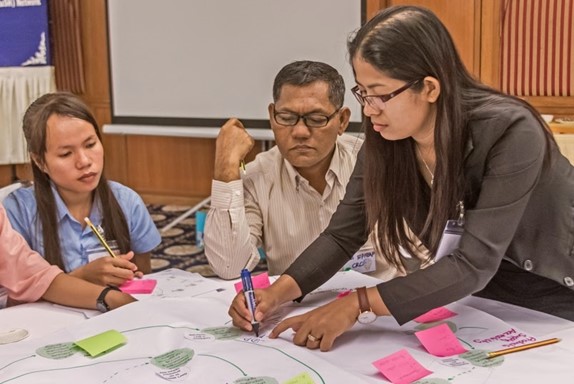Learning About Social Network Analysis in WASH Programs

Rural Sanitation and Hygiene (RuSH) Network members participate in a Social Network Analysis workshop in Phnom Penh in 2017. Photo credit: WaterSHED
Welcome to the first installment of the Social Network Analysis (SNA) in WASH Blog Series from Sustainable WASH Systems (SWS) Learning Partnership. Social Network Analysis is a unique data visualization tool that can be harnessed by all development sectors, and is particularly useful to WASH.
This first blog, Learning About Social Network Analysis in WASH Programs, defines social network analysis and suggests when during the Program Cycle to implement this tool for best results. Learn more about how SNA results helped SWS initiatives in our second post, Applying Social Network Analysis in WASH in Uganda and Kenya. The third blog, Social Network Analysis: Your Questions Answered, addresses best practices for conducting and applying SNA findings to WASH programs.
More and more, water, sanitation, and hygiene (WASH) implementers are adopting systems-thinking approaches to better understand local actors and the complex systems in which they live to uncover more sustainable WASH solutions.
Social Network Analysis (SNA) is a systems-based method increasingly recognized in WASH as a valuable instrument for all actors to better understand stakeholder relationships. Specifically, SNA provides evidence-based network “maps” that visually display member engagement, relationship and power dynamics, coordination levels, resource flows, and the network’s overall structure, among other elements.
This information can help facilitate network behavior that prioritizes learning, cooperation, and collaboration. It provides WASH implementers and network members with a big picture and purpose to guide everyone toward collective goals.
The USAID-funded Sustainable WASH Systems (SWS) Learning Partnership hosted an online training during which Rich Fromer from LINC, an SWS partner, shared how SWS partners used SNA during the design, implementation, and monitoring and evaluation (M&E) phases of program initiatives in Ethiopia, Kenya, Uganda, and Cambodia. Using SNA at these key program stages helped gain and retain stakeholder buy-in.
During the design phase, SNA helps implementers and stakeholders more fully understand an existing network structure, critical knowledge that informs program strategy, interventions, and partnership approaches. For example, an SNA during the design of an SWS program in Kitui County to develop, scale-up, and test a preventative rural water maintenance model, revealed that the County WASH Coordination Office held a central position in the local WASH network. The research also showed there were several peripheral WASH networks that did not fully communicate or coordinate with the government’s WASH efforts.
This information prompted SWS partners to design program support for the county government to support and work more closely with this existing network called the WASH Forum — a multi-stakeholder committee — that is valued by the government and works in conjunction with administrations toward county-wide, sustainable potable water services.
At the implementation and monitoring phases, SNA can highlight network trends and help stakeholders to shift from a technical WASH focus to a systems mindset that encourages collaboration. An endline SNA in Kitui showed that the county government was still central to the WASH network, but that the WASH Forum had progressed by leaps and bounds. Compared to the baseline, forum participation had increased to 63 actors and the overall network included more dedicated, core actors and fewer peripheral members, as demonstrated in the comparative figure below of the Kitui WASH network maps produced in 2018 and 2020.

Figure: Visualizations for all ties and frequencies between interviewed organizations in 2018 (left) and 2020 (right) in Kitui WASH Network
This has created a more resilient, connected and collaborative WASH network in Kitui, able to weather turnover and turmoil. The WASH Forum also produced results. It collaboratively developed the first county water bill that addresses the county’s most pressing WASH issues, including the need for better monitoring and professionalization of rural water service delivery, funding for water access in rural areas, and legal recognition of the forum.
Repeated SNAs throughout the Program Cycle offer insight into network trends and shifting behaviors. In Debre Birhan, Ethiopia, baseline analyses — including SNA — influenced stakeholders to create a Learning Alliance, similar to Kitui’s WASH Forum, to work with the government and other stakeholders to improve the town’s sanitation services. An endline SNA and supplemental interviews showed that the Learning Alliance had increased town dialogue around sanitation issues, and influenced the government to increase its sanitation budget by 68 percent between 2020 and 2021 — encouraging information for the systems-thinking and sustainability of these WASH programs.



